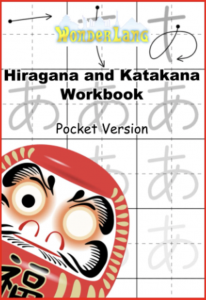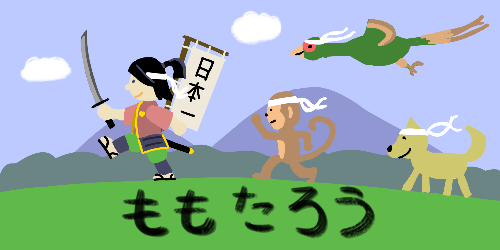Hello Everyone,
Here is a famous Japanese story: Momotarou (ももたろう)
Momotarou is one of the most famous Japanese stories outside of Japan. It counts how a young boy, found in a peach, will be fighting demons with his fellow companions.
You will find here a slightly modified version of the story, written in hiragana and katakana. Each word comes with its pronunciation and translation. These are hidden by default, and you just click/tap on a word to show them.
You also have some reading notes below the text, as well as a full translation at the end of the article.
The story was taken from the great hukumusume.com website:
http://hukumusume.com/douwa/0_6/jap_pc/08/01.htm
You will find there many stories organised in different difficulty levels according to Japanese school grades.
Momotarou’s story – part 1
ももたろう[momotarou]/ Momotarou /
1.[1.]/ 1. /
むかしむかし[mukashi mukashi]/ once upon a time /
、[,]/ , /
ある[aru]/ to be /
ところ[tokoro]/ place /
に[ni]/ {1-location} /
、[,]/ , /
おじいさん[ojii-san]/ old man /
と[to]/ {1-and} /
おばあさん[obaa-san]/ old woman /
が[ga]/ {focus} /
すんでいました[sunde imashita]/ were living /
。[.]/ . /
2.[2.]/ 2. /
おじいさん[ojii-san]/ old man /
は[wa]/ {topic} /
やま[yama]/ mountain /
へ[e]/ {destination} /
しばかり[shibakari]/ firewood gathering /
に[ni]/ {2-purpose} /
、[,]/ , /
おばあさん[obaa-san]/ old woman /
は[wa]/ {topic} /
かわ[kawa]/ river /
へ[e]/ {destination} /
せんたく[sentaku]/ laundry /
に[ni]/ {2-purpose} /
いきました[ikimashita]/ went /
。[.]/ . /
3.[3.]/ 3. /
おばあさん[obaa-san]/ old woman /
が[ga]/ {focus} /
かわ[kawa]/ river /
で[de]/ {place of action} /
せんたく[sentaku]/ laundry /
を[o]/ {object} /
している[shite iru]/ doing /
と[to]/ {4-then} /
、[,]/ , /
ドンブラコ、ドンブラコ[DONBURAKO,DONBURAKO]/ splash, splash /
と[to]/ {5-with} /
、[,]/ , /
おおきな[ookina]/ big /
もも[momo]/ peach /
が[ga]/ {focus} /
ながれて[nagarete]/ flow /
きました[kimashita]/ came /
。[.]/ . /
4.[4.]/ 4. /
「[“]/ “ /
おや[oya]/ my! /
、[,]/ , /
これ[kore]/ this /
は[wa]/ {topic} /
よい[yoi]/ good /
おみやげ[omiyage]/ present /
が[ga]/ {focus} /
できた[dekita]/ came out /
わ[wa]/ {emotion,emphasis} /
」[”]/ ” /
5.[5.]/ 5. /
おばあさん[obaa-san]/ old woman /
は[wa]/ {topic} /
おおきな[ookina]/ big /
もも[momo]/ peach /
を[o]/ {object} /
ひろいあげて[hiroi agete]/ pick up /
、[,]/ , /
いえ[ie]/ house /
に[ni]/ {3-direction} /
もちかえりました[mochi kaerimashita]/ brought back /
。[.]/ . /
6.[6.]/ 6. /
そして[soshite]/ then /
、[,]/ , /
おじいさん[ojii-san]/ old man /
と[to]/ {1-and} /
おばあさん[obaa-san]/ old woman /
が[ga]/ {focus} /
もも[momo]/ peach /
を[o]/ {object} /
たべよう[tabeyou]/ let's eat /
と[to]/ {3-to say} /
もも[momo]/ peach /
を[o]/ {object} /
きってみる[kittemiru]/ try to cut /
と[to]/ {4-then} /
、[,]/ , /
なんと[nanto]/ how /
、[,]/ , /
なか[naka]/ inside /
から[kara]/ from /
げんき[genki]/ healthy /
の[no]/ {relation} /
よい[yoi]/ good /
おとこ[otoko]/ boy /
の[no]/ {relation} /
あかちゃん[akachan]/ baby /
が[ga]/ {focus} /
とびだして[tobi dashite]/ jump out /
きた[kita]/ came /
の[no]/ {relation} /
です[desu]/ to be /
。[.]/ . /
7.[7.]/ 7. /
「[“]/ “ /
これ[kore]/ this /
は[wa]/ {topic} /
きっと[kitto]/ surely /
、[,]/ , /
かみさま[kami-sama]/ god /
が[ga]/ {focus} /
くださった[kudasatta]/ favoured /
に[ni]/ {2-purpose} /
ちがいない[chigainai]/ no error /
」[”]/ ” /
8.[8.]/ 8. /
こども[kodomo]/ child /
の[no]/ {relation} /
いなかった[inakatta]/ did not exist /
おじいさん[ojii-san]/ old man /
と[to]/ {1-and} /
おばあさん[obaa-san]/ old woman /
は[wa]/ {topic} /
、[,]/ , /
おおよろこび[oo-yorokobi]/ great joy /
です[desu]/ to be /
。[.]/ . /
9.[9.]/ 9. /
もも[momo]/ peach /
から[kara]/ from /
うまれた[umareta]/ born /
おとこのこ[otoko no ko]/ kid /
を[o]/ {object} /
、[,]/ , /
おじいさん[ojii-san]/ old man /
と[to]/ {1-and} /
おばあさん[obaa-san]/ old woman /
は[wa]/ {topic} /
ももたろう[momotarou]/ Momotarou /
と[to]/ {3-to say} /
なづけました[nazukemashita]/ to name /
。[.]/ . /
10.[10.]/ 10. /
ももたろう[momotarou]/ Momotarou /
は[wa]/ {topic} /
スクスク[SUKU SUKU]/ quickly /
そだって[sodatte]/ to grow /
、[,]/ , /
やがて[yagate]/ before long /
つよい[tsuyoi]/ strong /
おとこのこ[otoko no ko]/ kid /
に[ni]/ {4-indirect object} /
なりました[narimashita]/ became /
。[.]/ . /
11.[11.]/ 11. /
そして[soshite]/ then /
ある[aru]/ to be /
ひ[hi]/ day /
、[,]/ , /
ももたろう[momotarou]/ Momotarou /
が[ga]/ {focus} /
いいました[iimashita]/ told /
。[.]/ . /
12.[12.]/ 12. /
「[“]/ “ /
ぼく[boku]/ I (man) /
、[,]/ , /
おにがしま[onigashima]/ Onigashima /
へ[e]/ {destination} /
いって[itte]/ go /
、[,]/ , /
わるい[warui]/ evil /
おに[oni]/ demon /
を[o]/ {object} /
たいじ[taiji]/ eradication /
します[shimasu]/ do /
」[”]/ ” /
13.[13.]/ 13. /
そして[soshite]/ then /
、[,]/ , /
おばあさん[obaa-san]/ old woman /
に[ni]/ {5-passive agent} /
きびだんご[kibidango]/ millet dumplings /
を[o]/ {object} /
つくって[tsukutte]/ to fabricate /
もらう[morau]/ to receive /
と[to]/ {1-and},{2-or},{3-to say},{5-with},{6-if},{4-then} /
、[,]/ , /
おにがしま[onigashima]/ Onigashima /
へ[e]/ {destination} /
でかけました[dekakemashita]/ departed /
。[.]/ . /
Notes
– ドンブラコ、ドンブラコ: This is one particularity of the Japanese language with uses many onomatopoeia to represent concepts. Here “splash splash” for instance is used to image splatters.
– ももたろう: The name comes from もも /peach/, and たろう /eldest son/ which is a common given name or given name ending for men in Japan.
– おにがしま: This is a place name which can be translated to “The Demons’ Island” (おに /demon(s)/ が /{focus}/ しま /island/).
Full text and translation
ももたろう
1. むかしむかし、ある ところ に、おじいさん と おばあさん が すんでいました。
Once upon a time, there was a place where an old man and an old woman were living.
2. おじいさん は やま へ しばかり に、おばあさん は かわ へ せんたく に いきました。
The old man was going to the mountain to gather firewood, and the old woman was going to the river to do the laundry.
3. おばあさん が かわ で せんたく を している と 、 ドンブラコ、 ドンブラコと、 おおきな もも が ながれて きました 。
The old woman was at the river doing the laundry when, with a loud splatter, a big peach came flowing.
4. 「 おや 、 これ は よい おみやげ が できた わ 」
“My! What a good present!”
5. おばあさん は おおきな もも を ひろい あげて 、 いえ に もちかえりました 。
The old woman picked up the big peach and brought it back home.
6. そして 、 おじいさん と おばあさん が もも を たべよう と もも を きってみる と 、 なんと 、 なか から げんき の よい おとこ の あかちゃん が とびだして きた の です 。
Then, the old man and the old woman decided to eat the peach, and when they started to cut it, in some manner, an healthy and good baby boy jumped out of it.
7. 「 これ は きっと 、 かみさま が くださった に ちがいない 」
“There is undoubtedly a present offered by the gods.”
8. こども の いなかった おじいさん と おばあさん は、 おおよろこび です。
The old man and the old woman who had no child were in a great joy.
9. もも から うまれた おとこのこ を、おじいさん と おばあさん は ももたろう と なづけました。
The boy being born from a peach, the old man and the old woman named him Momotarou.
10. ももたろう は スクスク そだって 、 やがて つよい おとこのこ に なりました 。
Momotarou grew up quickly, and in the end became a strong boy.
11. そして ある ひ 、 ももたろう が いいました 。
Then, one day, Momotarou told:
12. 「 ぼく 、 おにがしま へ いって 、 わるい おに を たいじ します 」
I will go to Onigashima and eradicate all the demons!”
13. そして 、 おばあさん に きびだんご を つくって もらう と 、 おにがしま へ でかけました 。
Then, he received some millet dumplings made by the old woman, and started his way to Onigashima.
>> Part 2/3
Please, do not hesitate to comment on the article (do you like it, is the format convenient…).
Cheers,
Stéphane
Follow us:







